Meet the CIHR Institute of Infection and Immunity Community Advisory Committee
We are pleased to announce the collective strength and breadth of the CIHR Institute of Infection and Immunity Community Advisory Committee (CAC)!
These seven members come from urban and rural communities across Canada and bring to the Committee their varied and often under-represented research experience and knowledge, particularly in the fields of asthma, sepsis, post-COVID-19 condition, cystic fibrosis, hepatitis C, HIV, acute promyelocytic leukemia, multiple sclerosis and organ transplantation.
Learn more about CAC members who have shared their experiences below.
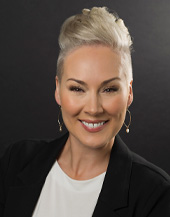
Michelle Burleigh, Ontario
Read Michelle’s Community Advisory Committee (CAC) member profile
After recovering from an aggressive form of leukemia, Michelle Burleigh started a website called SoYouveGotCancer to help Canadians who are newly diagnosed with cancer find resources, read other patient stories and learn about the journey through the Canadian Healthcare system through her own personal experiences. As a business professional and lifelong patient with lived experience, Michelle also founded The Clarity Lab, an organization dedicated to improving the patient experience in the Canadian healthcare system. Michelle educates and inspires Canadians to take a proactive role in their own care and supports healthcare organizations in shifting towards patient-centric tools and solutions.
Most recently, Michelle has dedicated herself to advocating for equitable treatment of people with compromised immune systems. In 2020, six months after the COVID-19 pandemic began, she founded Immunocompromised People Are Not Expendable, an online support group for the global immunocompromised community. Then in 2023, she became the Co-Chair of the newly formed, Canadian Immunocompromised Advocacy Network (CIAN) and a founding steering committee member of the International Immunocompromised Advocacy Network.
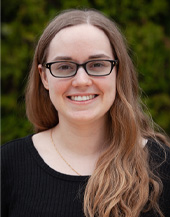
Bryna Gibbons, Alberta
Bryna Gibbons lives in amiskwaciy-wâskahikan (Edmonton). She completed a Master of Public Health in Health Promotion in 2023. She is passionate and always seeking to learn more about health equity and community engagement. In her free time, she enjoys embroidery, genealogy, and saving recipes she may or may not ever try!
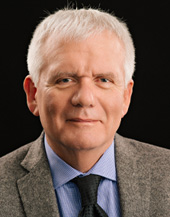
Daryl Luster, British Columbia
Daryl Luster was living with hepatitis C virus (HCV) genotype 1a when he participated in a Phase II clinical trial in 2010. The care he received cured him.
His work as an advocate and peer educator focuses on shedding more light on hepatitis C virus (HCV), with people affected, caregivers, legislators, and healthcare professionals. Daryl is also a member of the CIHR HIV/AIDS and STBBI Research Advisory Committee (CHASRAC).
As we know with new treatments, a cure is possible now for all people who are diagnosed and linked to care, and there is a need for improved understanding about the long-term effects of viral infections like HCV and other sexually transmitted and blood-borne infections (STBBI). As someone who lived with Hepatitis C, he has a keen insight into what the experience can be like. The greatest issue we face now is access to the supports and resources needed for testing, care and treatment in Canada. He speaks with patients regularly, and it is their voice that drives him in his work.
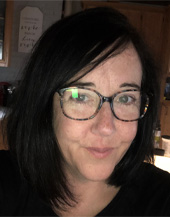
Karina Prévost, Quebec
Karina Prévost was born with cystic fibrosis. Nine years ago, she underwent a lung transplant, an experience that intensified her dedication to raising awareness and contributing to advancements in healthcare practices and access to primary care. This personal journey has exposed her to the fragility of life and strengthened her resilience in the face of various challenges, including the loss of her father and her younger half-sister Vanessa, who also had cystic fibrosis.
Having maintained a partnership with her own care team for over 45 years, Karina transitioned to becoming a patient partner in the healthcare sector post-transplant, engaging in various capacities. She dedicated three years to volunteering with Syrian refugees and served as the provincial director of the Canadian Transplant Association (Quebec). Karina participated twice in the Canadian Transplant Games (Toronto, Vancouver), as well as in the World Transplant Games in Spain and the World Winter Games in Canada, where she clinched the world champion title in alpine skiing.
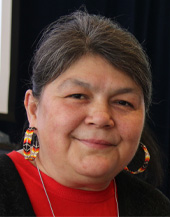
Florence (Flo) Ranville, British Columbia
Florence (Flo) Ranville is Pine Creek First Nations on her father's side and Woodlands Cree on her mother's side. She has seven children and six grandchildren. Flo has been HIV+ for 25 years. Flo contracted hepatitis C in 1998 before contracting HIV in 1999 and completed Interferon treatment with no return in 2002. She has worked in community-based research (CBR) since 2005 as a peer researcher, peer mentor, and peer consultant. Flo has worked part-time as an HCV/HIV Support worker at Options for Sexual Health Clinic since March 2022.
Flo is a personal survivor of violence, child apprehension, substance use, homelessness, incarceration, and financial insecurity/poverty. Flo was also a previous sex worker. Flo experienced discrimination/stigma in the healthcare system in 2017 and almost died. Flo is passionate about supporting community members who have faced similar barriers to health, drawing on Cree teachings and lived experiences to care for them holistically.
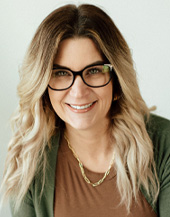
Kristine Russell, Alberta
In 2014, Kristine Russell faced a critical life-threatening illness that significantly impacted both her and her newborn daughter. Since then, she has dedicated herself to advancing patient quality improvement, engaging in collaborative research, and enhancing health-related quality of life. With a background in healthcare communications, her commitment extends to professional communication settings and patient advisory roles, aiming to positively influence healthcare environments and beyond.
Kristine's interest lies in patients who have experienced critical illnesses, particularly within the neonatal and pediatric population. However, her enthusiasm spans across all aspects of research, healthcare delivery, and patient outcomes, showcasing her holistic approach to healthcare advancement. She has collaborated with various organizations, including Alberta Health Services, CanChild, University of Calgary, Dalhousie University, WHO, Society of Critical Care Medicine, University of British Columbia's Action on Sepsis Research Cluster, and Sepsis Canada. In her current role at Healthcare Excellence Canada, she leverages her extensive background to work nationally, fostering collaboration with individuals and organizations nationwide. Her focus is on disseminating innovations, enhancing capability, and driving policy changes to elevate healthcare safety and quality.
Kristine resides with her husband and three children in Medicine Hat, Alberta, acknowledging and honoring the traditional territories of the First Nation People of Treaty 7, Treaty 4, and Métis people. Her family recognizes that this territory is home to the Métis Nation of Alberta, Region 3, within the historical Northwest Métis homeland, and acknowledge all Nations—Indigenous and non—who live, work, and play on this land, honoring and celebrating this territory.
- Date modified: